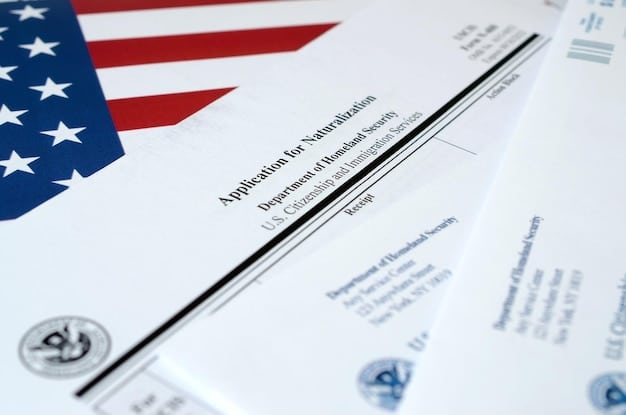Understanding US Government Benefits: A Comprehensive Eligibility Guide

Understanding the Eligibility Requirements for US Government Benefits Programs is crucial for accessing support. These programs provide assistance to individuals and families in need, but specific criteria must be met to qualify. This guide clarifies these requirements.
Navigating the landscape of US government benefits can be complex. Understanding the Eligibility Requirements for US Government Benefits Programs is the first step towards accessing vital assistance. Whether you’re seeking support for healthcare, housing, food, or other essential needs, this guide provides a clear overview of the key criteria you need to know.
Let’s explore the requirements and help you determine your eligibility for these crucial programs.
Understanding the Eligibility Requirements for US Government Benefits Programs
Understanding the Eligibility Requirements for US Government Benefits Programs is key to accessing vital support systems in the United States. These programs are designed to assist individuals and families facing various challenges, but eligibility criteria can sometimes be difficult to understand. This section provides a general overview of these programs and the common factors that determine who can qualify.
The US government offers a wide range of benefits programs, each with its own specific set of eligibility requirements. These programs aim to provide a safety net for those in need, ensuring access to essential resources and opportunities. Let’s break down some of the common factors considered when determining eligibility.
Common Eligibility Factors
Many US government benefits programs consider similar factors when determining eligibility. These often include income, household size, age, disability status, and US citizenship or legal residency. Understanding these factors can help you assess your potential eligibility for various programs.
- Income: Most programs have income limits, meaning your household income must fall below a certain threshold to qualify. These limits vary depending on the program and your location.
- Household Size: The number of people in your household can affect your eligibility and the amount of benefits you receive. Larger households generally have higher income limits.
- Age: Some programs are specifically for older adults or children. For example, Social Security benefits have age requirements.
- Disability Status: Individuals with disabilities may be eligible for programs like Social Security Disability Insurance (SSDI) or Supplemental Security Income (SSI).

Types of Government Benefits Programs
The US government offers a wide array of benefits programs, addressing various needs and populations. These include programs focused on healthcare, nutrition assistance, housing support, and financial aid. Each program has its own specific goals and eligibility requirements.
Here’s a glimpse at some of the major categories:
- Healthcare: Programs like Medicaid and the Children’s Health Insurance Program (CHIP) provide healthcare coverage to low-income individuals and families.
- Nutrition Assistance: The Supplemental Nutrition Assistance Program (SNAP) helps low-income individuals and families purchase groceries.
- Housing Support: Programs like Section 8 vouchers provide rental assistance to help low-income families afford housing.
- Financial Aid: Programs like Temporary Assistance for Needy Families (TANF) provide cash assistance to families with children.
In conclusion, Understanding the Eligibility Requirements for US Government Benefits Programs begins with recognizing common eligibility factors and the broad categories of available support programs. Remember, each program is unique, so it’s essential to research the specific requirements of the programs that interest you.
Detailed Look at Key US Government Benefits Programs
To truly grasp the landscape of US government benefits, it’s helpful to examine some of the most prominent programs in detail. This section will delve into the eligibility requirements, benefits offered, and application processes for several key programs, helping you gain a deeper understanding of how they work.
Let’s take a closer look at some of the programs and Understanding the Eligibility Requirements for US Government Benefits Programs they entail. Understanding these details can empower you to make informed decisions and navigate the application process more effectively.
Social Security Benefits
Social Security provides retirement, disability, and survivor benefits to eligible individuals and their families. Eligibility is primarily based on work history and contributions to the Social Security system.
To qualify for retirement benefits, you generally need to have worked for at least 10 years (40 credits) in jobs covered by Social Security. The amount of your benefit is based on your average lifetime earnings. Disability benefits are available to those who are unable to work due to a medical condition that is expected to last at least one year or result in death.
Medicare and Medicaid
Medicare provides health insurance to people age 65 or older and certain younger people with disabilities or chronic conditions. Medicaid provides healthcare coverage to low-income individuals and families.
- Medicare: Generally, if you or your spouse worked for at least 10 years (40 quarters) in Medicare-covered employment, you are eligible for Medicare Part A (hospital insurance) at age 65.
- Medicaid: Eligibility for Medicaid varies by state but is generally based on income and household size. Some states have expanded Medicaid coverage under the Affordable Care Act, making it available to more low-income adults.

Supplemental Nutrition Assistance Program (SNAP)
SNAP helps low-income individuals and families purchase groceries. Eligibility is based on income, household size, and certain other factors. SNAP benefits are provided on an Electronic Benefit Transfer (EBT) card, which can be used at most grocery stores.
To be eligible for SNAP, your household income must generally be below certain limits, which vary by state. Asset limits may also apply. Certain individuals, such as those who are elderly or disabled, may have different eligibility rules.
In conclusion, this section has provided a detailed look at some key US government benefits programs, highlighting their eligibility requirements, benefits offered, and application processes. By Understanding the Eligibility Requirements for US Government Benefits Programs and the nuances of each program, you can better determine which programs might be right for you and how to apply.
Navigating the Application Process for US Government Benefits Programs
Once you’ve determined which US government benefits programs you might be eligible for, the next step is navigating the application process. This can sometimes seem daunting, but with the right information and resources, you can successfully apply for the benefits you need. This section provides practical tips and guidance to help you through the application process.
Successfully applying for government benefits requires careful attention to detail and a systematic approach. Let’s explore the key steps involved and how to understanding the Eligibility Requirements for US Government Benefits Programs.
Gathering Required Documentation
One of the most important steps in the application process is gathering all the required documentation. This may include proof of income, residency, citizenship or legal immigration status, age, and disability status. Having these documents ready ahead of time can speed up the application process and prevent delays.
Common documents you may need include:
- Social Security card(s)
- Birth certificate(s)
- Proof of income (pay stubs, tax returns)
- Proof of residency (utility bills, lease agreement)
Finding the Right Application Forms and Resources
Application forms for US government benefits programs are typically available online or at local government offices. Many programs also have online application portals where you can submit your application electronically.
In addition to application forms, there are many resources available to help you understand the application process and answer any questions you may have. These resources may include:
- Program websites: These websites often provide detailed information about eligibility requirements and the application process.
- Government agencies: Local government agencies can provide assistance with completing application forms and answering questions.
- Community organizations: Many community organizations offer free assistance with applying for government benefits.
Tips for a Successful Application
Follow these tips to maximize your chances of a successful application:
- Read the instructions carefully: Make sure you understand all the instructions before you start filling out the application.
- Answer all questions accurately: Provide accurate and complete information on the application.
- Double-check your application: Review your application carefully before submitting it to make sure there are no errors.
- Keep a copy of your application: Make a copy of your application and all supporting documents for your records.
- Follow up if needed: If you haven’t heard back about your application within a reasonable amount of time, follow up with the agency to check on its status.
In conclusion, Navigating the application process for US government benefits programs requires preparation, attention to detail, and access to the right resources. By Understanding the Eligibility Requirements for US Government Benefits Programs, gathering required documentation, and following these tips, you can increase your chances of a successful application and access the support you need.
Common Mistakes to Avoid When Applying for US Government Benefits
Applying for US government benefits can be a complex process, and it’s easy to make mistakes that can delay or even disqualify your application. This section will highlight some of the most common mistakes people make when applying for benefits and provide tips on how to avoid them. By being aware of these potential pitfalls, you can increase your chances of a successful application.
Even with careful preparation, mistakes can happen. Let’s examine some frequent errors and how to understanding the Eligibility Requirements for US Government Benefits Programs.
Inaccurate or Incomplete Information
One of the most common mistakes is providing inaccurate or incomplete information on the application. This can include errors in your Social Security number, income information, or household size. Make sure to double-check all information before submitting your application.
To avoid this mistake, carefully review all information on your application before submitting it. Compare the information to supporting documents, such as your Social Security card and pay stubs.
Missing Deadlines
Many US government benefits programs have deadlines for submitting applications or providing required documentation. Missing these deadlines can result in your application being denied or delayed. Be sure to keep track of all deadlines and submit your application and documents on time.
Failing to Report Changes
Many programs require you to report any changes that may affect your eligibility, such as changes in income, household size, or address. Failing to report these changes can result in overpayment of benefits or even termination of your benefits. Be sure to report any changes to the appropriate agency as soon as possible.
- Changes in income
- Changes in household size
- Changes in address
Not Seeking Help When Needed
If you’re unsure about any aspect of the application process, don’t hesitate to seek help from government agencies, community organizations, or legal aid providers. These organizations can provide free assistance with completing application forms, gathering required documentation, and understanding your rights and responsibilities.
In conclusion, Understanding common mistakes and how to avoid them is essential for a smooth and successful application process. By paying attention to detail, meeting deadlines, reporting changes promptly, and seeking help when needed, you can increase your chances of receiving the US government benefits you deserve. It’s always crucial understanding the Eligibility Requirements for US Government Benefits Programs.
Staying Informed About Changes to US Government Benefits Programs
US government benefits programs are subject to change, whether due to new legislation, policy updates, or economic factors. Staying informed about these changes is crucial to ensuring that you continue to meet the eligibility requirements and receive the benefits you need. This section provides tips on how to stay up-to-date on the latest changes to US government benefits programs.
The landscape of government benefits is dynamic, and staying informed is essential. Let’s explore ways to Understanding the Eligibility Requirements for US Government Benefits Programs and keep abreast of any updates.
Subscribing to Email Updates
Many government agencies and advocacy organizations offer email updates on changes to US government benefits programs. Subscribing to these email lists is a great way to receive timely notifications about new developments that may affect your eligibility or benefits.
Monitoring Government Websites
Government websites, such as those of the Social Security Administration, Medicare, and Medicaid, are valuable resources for staying up-to-date on program changes. These websites often feature news releases, policy updates, and other important information about benefits programs.
- Social Security Administration (SSA)
- Centers for Medicare & Medicaid Services (CMS)
- Food and Nutrition Service (FNS)
Following News and Media Outlets
Stay informed about changes to US government benefits programs by following reputable news and media outlets that cover these issues. Look for articles and reports that provide in-depth analysis of policy changes and their potential impact on beneficiaries.
Consulting with Experts
Consider consulting with experts, such as financial advisors, social workers, or legal aid providers, to stay informed about changes to US government benefits programs. These professionals can provide personalized advice and guidance based on your individual circumstances.
In conclusion, Staying informed about changes to US government benefits programs is essential for maintaining your eligibility and receiving the benefits you need. By utilizing these strategies, you can stay up-to-date on the latest developments and ensure that you continue to receive the support you deserve. Always remember to understanding the Eligibility Requirements for US Government Benefits Programs and consult official resources for accurate information.
| Key Point | Brief Description |
|---|---|
| 📝 Eligibility Factors | Income, age, household size, and disability can impact eligibility. |
| ✅ Required Docs | Gather documents like Social Security cards and pay stubs. |
| 📅 Deadline Awareness | Note application deadlines to avoid delays or denials. |
| 🌐 Stay Informed | Subscribe to updates and monitor government websites for changes. |
Frequently Asked Questions
Most programs consider income, household size, age, disability status, and US citizenship or legal residency when determining eligibility. Understanding the Eligibility Requirements for US Government Benefits Programs involves assessing these factors.
Official program websites, government agencies, and community organizations are excellent resources for detailed information about specific requirements and application processes.
You generally need your Social Security card, birth certificate, proof of income (pay stubs, tax returns), and proof of residency (utility bills, lease agreement). Understanding the Eligibility Requirements for US Government Benefits Programs often requires these documents.
You typically need to report any changes that may affect your eligibility, such as changes in income, household size, or address, to the appropriate agency as soon as possible.
Government agencies, community organizations, and legal aid providers can offer free assistance with completing application forms, gathering documents, and understanding the Eligibility Requirements for US Government Benefits Programs.
Conclusion
Understanding the Eligibility Requirements for US Government Benefits Programs is a vital step toward accessing the support you need. By taking the time to research the programs available, gathering the necessary documentation, and seeking help when needed, you can successfully navigate the application process and secure the benefits you deserve.
Remember to stay informed about any changes to program requirements and take advantage of the resources available to you. With diligent effort and a clear understanding of the requirements, you can access vital assistance and improve your overall well-being.





